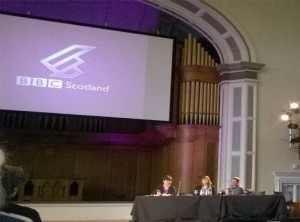 On 25th February Publishing Scotland and the Booksellers Association held their annual Scottish Book Trade Conference in Edinburgh. While all of the presentations were extremely interesting and informative, with one involving a number of amusing Star Wars references, the session I was most looking forward to was Adapting books for TV & Radio. Chaired by journalist Sheena McDonald with panelists Gaynor Holmes (Head of TV Drama at BBC Scotland) and Bruce Young (Head of Radio Drama at BBC Scotland), the session provided an informative insight into the work it takes to successfully adapt a novel for television or radio.
On 25th February Publishing Scotland and the Booksellers Association held their annual Scottish Book Trade Conference in Edinburgh. While all of the presentations were extremely interesting and informative, with one involving a number of amusing Star Wars references, the session I was most looking forward to was Adapting books for TV & Radio. Chaired by journalist Sheena McDonald with panelists Gaynor Holmes (Head of TV Drama at BBC Scotland) and Bruce Young (Head of Radio Drama at BBC Scotland), the session provided an informative insight into the work it takes to successfully adapt a novel for television or radio.
In the past decade eleven of BBC Scotland’s fifty eight television productions have been adaptations, such as Case Histories and Hamish Macbeth. It can take anywhere from eighteen months to three or four years to adapt a novel for television so those in charge look for known titles, award-winning or best-selling novels, to adapt in order to increase their chances of attracting the five to eight million viewers who regularly watch BBC One dramas. Gaynor explained that while it is inevitable changes will have to be made to the original content, producers must adapt the novel with a great deal of integrity and remain respectful of the original intent. When trying to get around obstacles in the adaptations, writers sometimes change element after element of the plot in order to suit television, but Gaynor stated that it is at this point a step back must be taken and the following question asked: should we just write an original drama? Sometimes the plot of a novel is simply used as inspiration to create original content, such as Monarch of the Glen.
While many of us wince when we hear that our favourite novel is being developed into a television show or film and instantly worry about the content that will be changed or simply ignored, Gaynor explained some of the challenges of adapting a novel. The majority of productions are bound by their budget and so merge characters and locations together, especially as there isn’t enough time to develop each individual character if they are not integral to the plot. Some novels simply do not lend themselves to adaptation at all, such as stories that involve a lot of internal monologue. One of the main rules of television is “show, not tell”, and this simply cannot be done in some cases. While BBC Scotland try to remain as faithful to the text as possible, it must be accepted that the content will be different for different mediums. Perhaps these are points we should consider the next time we are about to despair that one of our favourite scenes didn’t make the final cut.
Though some books may not be suitable for television, they may be easily adapted into radio productions, and Gaynor light-heartedly bemoaned the fact that a number of books she has failed to adapt have been made into radio programmes by Bruce. Sixty hours of drama and readings are commissioned for Radio 4, Radio Scotland, Radio 3 and Radio 4 Extra each year, and Bruce said that Radio Scotland try to strike an even balance between producing readings of international books, such as the recent East of Eden, and Scottish books, such as 44 Scotland Street; this is in spite of a recent complaint asking why so many Scottish voices were being heard on the radio. The question was raised whether authors have a hand in adapting their material for radio and Bruce answered that most leave him to do the work, with one author stating something along the lines of: “If we take the money, we must accept the changes”. However there are some authors, such as Alexander McCall Smith, who write both the book and the adaptations; quite an amazing feat. Once radio adaptations are made they are enduring and can be enjoyed by generations for years to come.
The forty five minute session passed by extremely quickly and the panelists were fantastic to listen to. It certainly gave me an appreciation for all the work that goes into creating BBC Scotland’s wonderful productions and I look forward to seeing what they will adapt next.